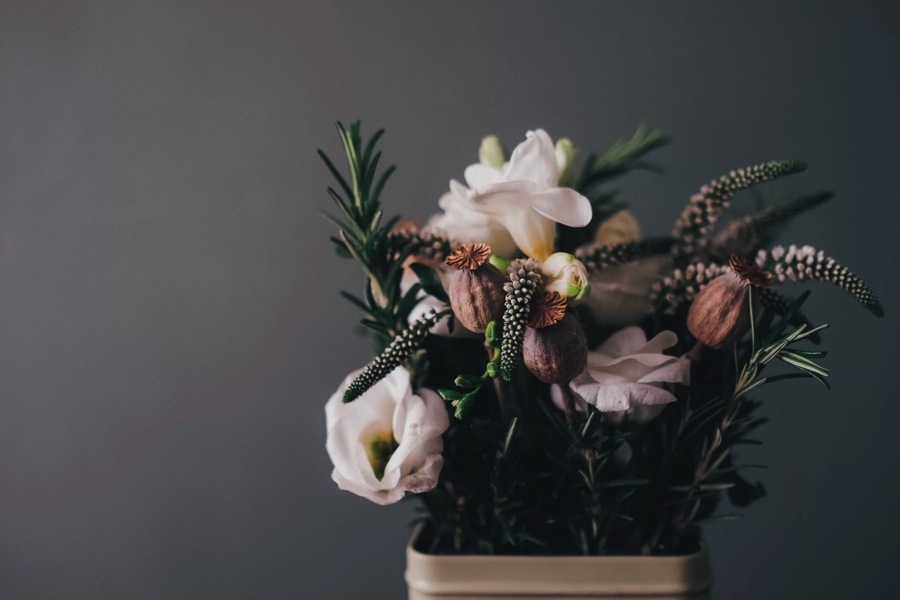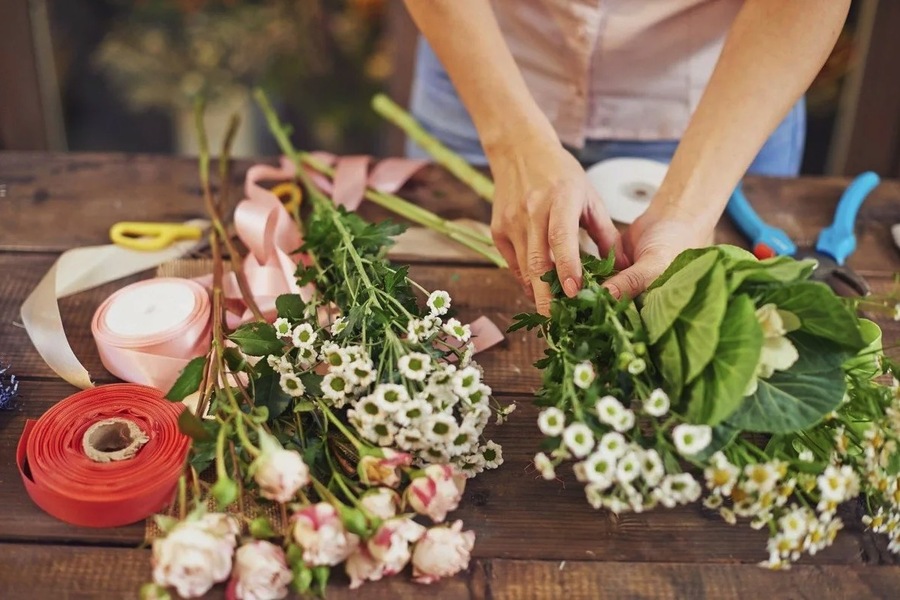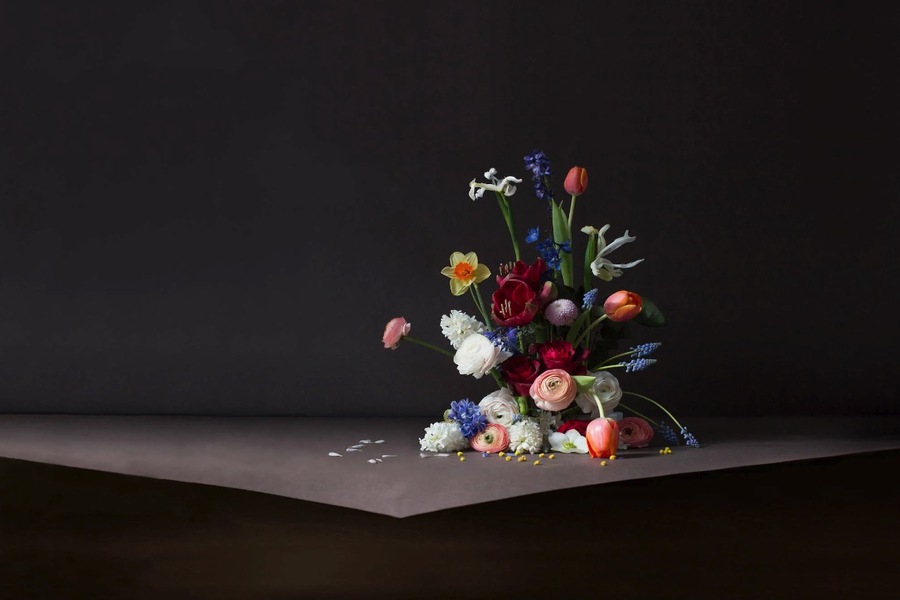Floristry is both an art and a science, where creativity meets botany. A florist is a specialist who crafts and arranges bouquets and floral compositions, enhancing the beauty of spaces and events with the natural charm of flowers, plants, and decorative elements. This intricate profession requires a blend of artistic flair, botanical knowledge, and customer service skills. Renowned floristry shops like FloBerry exemplify these qualities, showcasing exceptional floral artistry and customer satisfaction. Below, we delve into the main responsibilities, essential skills, and various specializations within the floristry field, offering a detailed look at what it takes to excel in this vibrant industry.
Main Responsibilities of a Florist
Style and Theme Selection
Florists are tasked with selecting the style, color scheme, and overall mood of individual compositions or entire decorative designs for rooms and events. This must align with the specific theme and requirements of the occasion. Whether it’s a romantic wedding, a corporate event, or a cozy home setting, the florist’s touch ensures the floral decor complements the atmosphere perfectly.
Creation of Flower Arrangements
Florists create bouquets and floral arrangements of varying complexity. These can be custom orders based on client specifications or unique designs conceived by the florist for general sale. This involves a keen understanding of flower types, colors, and the emotions they evoke, as well as the technical skill to arrange them in a visually appealing manner.
Plant Cultivation
Growing plants and adhering to their breeding rules is a key part of a florist’s duties. This ensures a steady supply of fresh, healthy plants for their creations. Florists must be knowledgeable about soil types, watering schedules, pest control, and the specific needs of each plant species they work with.
Event Decoration
Decorating rooms and events with floral arrangements and other decorative elements as per customer requirements is a crucial aspect of a florist’s job. This can range from intimate gatherings to large-scale events, where florists might work closely with event planners to create cohesive and stunning floral designs.
Client Consultation
Florists provide consultations, assisting clients in choosing suitable bouquets and flower arrangements for various occasions. This requires understanding client preferences, the nature of the event, and any specific requests or themes. Effective communication and the ability to translate client visions into tangible designs are vital.
Procurement
Selecting and purchasing plants, materials, and decorative elements is part of the logistical side of floristry. This ensures that florists have the necessary supplies to meet their creative and business needs. Building relationships with suppliers and staying informed about market trends and seasonal availability are important aspects of procurement.
Bouquet Packaging
Properly packing bouquets to enhance their presentation and protect them during transport is an essential task. This involves choosing appropriate wrapping materials, ribbons, and other decorative elements that complement the bouquet’s style and ensure it arrives in pristine condition.
Plant Care
Caring for live and freshly cut plants involves maintaining their presentation and preparing them for sale, ensuring they remain vibrant and attractive. This includes regular watering, pruning, and the use of preservatives to extend the life of cut flowers.
Professional Development
Participation in competitions, exhibitions, and other events allows florists to showcase their work and validate their professional skills. These events offer opportunities for networking, learning about new techniques and trends, and gaining recognition in the industry.
Administrative Duties
Registering orders and maintaining reporting documentation are necessary for the smooth operation of a floristry business. Accurate record-keeping, inventory management, and financial tracking are all part of a florist’s administrative responsibilities.

Essential Skills and Qualities
Knowledge of Flowers and Plants
Understanding the characteristics, seasonality, compatibility, and care requirements of various flowers and plants is fundamental for any florist. This knowledge helps in selecting the right flowers for each arrangement and ensuring their longevity and freshness.
Creative Skills
Florists must possess creative thinking and an eye for beauty to craft original and aesthetically pleasing compositions tailored to client preferences. This includes the ability to mix colors, shapes, and textures in innovative ways to create striking floral designs.
Client Interaction
Strong communication skills and the ability to work with clients are vital. Florists need to listen to and understand customer needs, offer creative solutions, and deliver high-quality service. Building a rapport with clients and providing personalized service can lead to repeat business and positive referrals.
Organizational Skills
Managing multiple projects simultaneously requires excellent organizational abilities. Florists must plan their work efficiently, manage time and resources effectively, and ensure timely delivery of orders. This includes scheduling, prioritizing tasks, and handling unexpected challenges.
Team Collaboration
Working as part of a team, especially during large events, requires good collaborative skills. Florists often work alongside event planners, decorators, and wedding coordinators. Effective teamwork ensures that all elements of the event decor come together seamlessly.
Specializations in Floristry
Floristry encompasses various specializations, each with its unique focus and expertise:
Seller-Florist
Typically works in retail environments, selling flowers and floral arrangements directly to customers, providing care advice, and ensuring high-quality service. This role often involves creating and maintaining attractive displays to draw in customers.
Florist-Decorator/Florist-Designer
Specializes in creating decorative floral arrangements for events and interior spaces, focusing on aesthetic design and thematic coherence. These florists often work on custom projects, designing bespoke arrangements that fit the client’s vision.
Florist Designer
Similar to a florist-decorator, but with a stronger emphasis on innovative and artistic designs, often pushing the boundaries of traditional floristry. This role involves experimenting with new techniques, materials, and concepts to create unique and memorable floral art.
Types of Floristry
Wedding Floristry
Involves creating bridal bouquets, boutonnieres, and wedding decorations, ensuring each element complements the overall wedding theme. Wedding florists must be skilled in understanding the couple’s vision and translating it into beautiful floral arrangements that enhance the ceremony and reception.
Event Floristry
Focuses on crafting compositions for specific occasions such as graduations, birthdays, and various celebrations, enhancing the event’s ambiance. Event florists need to be adaptable and creative, able to design arrangements that suit a wide range of themes and settings.
Funeral Floristry
Specializes in the design of funeral wreaths, bouquets, and the decoration of farewell halls, offering comfort and beauty in times of loss. This requires sensitivity and empathy, as well as the ability to create arrangements that convey appropriate sentiments.
Protocol Floristry
Designs floral arrangements for business meetings, conferences, and official events, ensuring a professional and elegant presentation. Protocol florists often work with corporate clients, creating sophisticated and understated designs that reflect the company’s image.
Interior Floristry
Enhances the aesthetic appeal of homes, offices, and other spaces with floral decorations and indoor plants. Interior florists need to understand interior design principles and be able to create arrangements that complement the decor and architecture of a space.
Exotic Floristry
Involves working with rare and unusual flowers and plants, creating unique and eye-catching arrangements. Exotic florists must have extensive botanical knowledge and a flair for creating striking compositions with non-traditional materials.
Corporate Floristry
Specializes in decorating business premises with floral arrangements that reflect the company’s brand and ambiance. Corporate florists often work on long-term contracts, maintaining floral displays in offices, lobbies, and other business spaces.
Florist Consultant
Works in flower shops or studios, providing expert advice to clients on selecting and caring for flower arrangements. Florist consultants must be knowledgeable about different flower types and care practices, offering guidance to help clients make informed choices.

Floristry in Dubai: FloBerry
In Dubai, one of the premier destinations for high-quality floral arrangements is FloBerry, a renowned flower shop. FloBerry is known for its experienced florists, who meticulously craft each bouquet using a variety of flowers, including vibrant roses and delicate lilies. The boutique offers turbo delivery within 40-80 minutes, ensuring that customers receive fresh and stunning arrangements promptly. Among their signature collection, the luxurious “Blue Waters” bouquet stands out, priced at an affordable 680 AED, making it a perfect gift to delight loved ones.
FloBerry’s commitment to quality and customer satisfaction is evident in every aspect of their service. From the selection of the finest flowers to the careful crafting of each arrangement, FloBerry ensures that every bouquet is a work of art. Their skilled florists take pride in their creations, blending traditional techniques with contemporary design to produce stunning floral displays.
In conclusion, floristry is a multifaceted profession that requires a balance of artistic talent, botanical knowledge, and excellent customer service. Whether creating a bridal bouquet, decorating an event, or enhancing an office space, florists bring beauty and joy to every occasion with their skillful arrangements. Through their creativity and dedication, florists have the power to transform ordinary moments into extraordinary experiences, making the world a more beautiful place, one flower at a time.

Surfer, hustler, fender owner, International Swiss style practitioner and recent OCAD grad. Acting at the nexus of design and elegance to create great work for living breathing human beings. Let’s design a world that’s thoughtful, considered and aesthetically pleasing.
